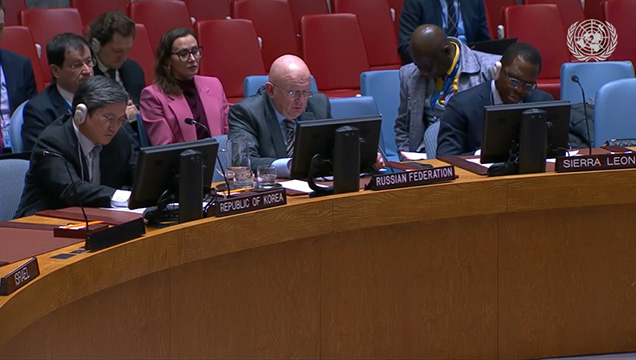 Photo: The Permanent Mission of Russia to the United Nations
Photo: The Permanent Mission of Russia to the United Nations
Statement by Permanent Representative Vassily Nebenzia at a UN Security Council briefing on the Situation with Peacekeeping Missions in Lebanon and the Golan Heights. Key points:
- What matters most amid heightened tensions in the region is whether UN member States and the Security Council are willing to stand up for peacekeepers who are facing direct threats to their safety and obstacles to implementing their mandate. This is precisely what the future of peacekeeping depends on, because it would be simply impossible to achieve confidence in peacekeeping without the firm support of all the members of the Security Council.
- Our briefers’ statements make it clear that the United Nations Interim Force in Lebanon (UNIFIL) and the United Nations Disengagement Observer Force (UNDOF) encounter the same very specific challenge. I’m referring here to Israel's arbitrary actions in the zone of deployment of these missions, undertaken in violation of relevant UNSC and UNGA resolutions and international agreements.
- In Lebanon, during the recent ground invasion, the IDF units occupied part of the territory north of the Blue Line and attacked UNIFIL facilities, including using tanks. At the height of the war, the Israeli military and political leadership even demanded the withdrawal of peacekeeping forces from the south of Lebanon, which runs counter UNSC resolutions 1701 and 2749. To the credit of peacekeepers, they did not give in to direct threats and did not move an inch.
- Israel continues to violate airspace, including by delivering indiscriminate airstrikes. There have been documented Israeli shelling in the immediate vicinity of peacekeepers. What gives rise to our particular concern is the widespread destruction by Israel of civilian infrastructure and housing as well as bans on the movements of the Lebanese and their returning home.
- Against the background of the numerous violations of ceasefire agreements, we should clarify how such violations can be prevented by the renewed monitoring mechanism in Lebanon, which UNIFIL is part of. We reaffirm our support for the initiative of our Algerian friends to send a Security Council mission to that country, including in order to send a clear message in favor of upholding the ceasefire regime.
- The situation is even more unpredictable in the disengagement sector. In Syria, the Israelis took advantage of political uncertainty in Damascus to inflict serious damage on military capabilities of the country and seize more than 500 square kilometers of land. Thus, in contravention of the 1974 Agreement on Disengagement, they occupied the buffer zone in the Golan Heights area, the Bravo side, the southeastern slope of Mount Hermon, and moved deep into Syria into Quneitra province. We are receiving alarming signals from West Jerusalem that the 1974 Agreement is no longer valid and that Mount Hermon should be returned to Israel. In such conditions, it appears impossible for the Blue Helmets to effectively carry out the tasks assigned to them.
- At the same time, the new Syrian authorities have confirmed their consent to the deployment of UN peacekeeping forces in the buffer zone in the Golan Heights. The Lebanese authorities have proved in word and deed their unwavering support for the peacekeepers.
- The meaningful operation of UNIFIL and UNDOF will not be possible as long as the sovereignty and territorial integrity of both Arab republics are threatened and the relevant UNSC and UNGA resolutions are not implemented. This applies first and foremost to Israel that has invaded neighboring Arab countries. We call on the Security Council to unequivocally defend these principles. Without observance of these principles, it would be impossible to normalize and stabilize the situation in the region.
- All these problems have occurred not out of thin air, but against the background of unprecedented military operations by Israel, whose is leadership is openly speaking of waging war on seven fronts. Until recently, those Israeli operations enjoyed the unconditional support – both military and political – from Washington, whose failed policy is precisely what triggered the crisis that have already engulfed the entire Middle East region, its civilians and the peacekeepers working there, who continue to heroically carry out their duty in line with the mandate entrusted to them.
read more in our Telegram-channel https://t.me/The_International_Affairs

 11:44 20.01.2025 •
11:44 20.01.2025 •






















